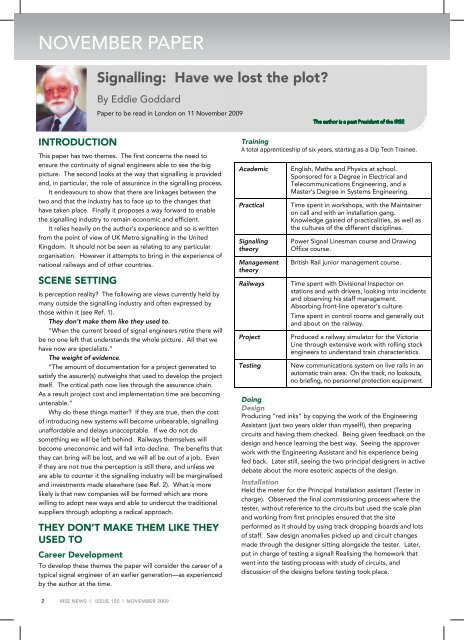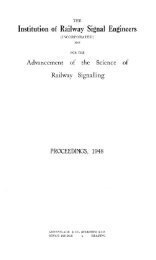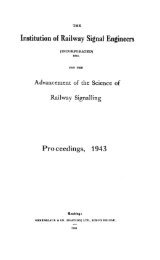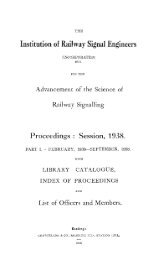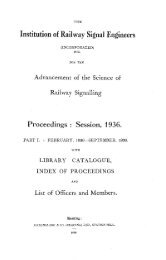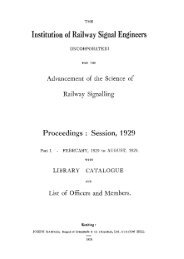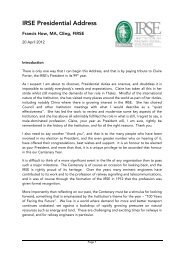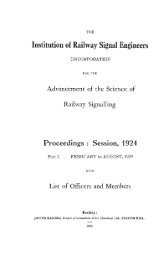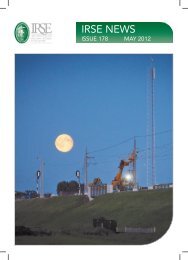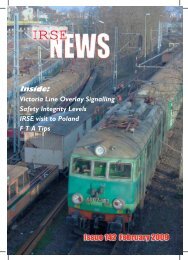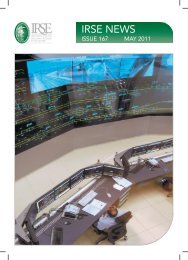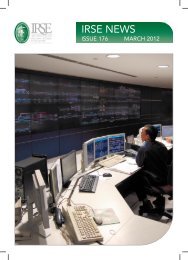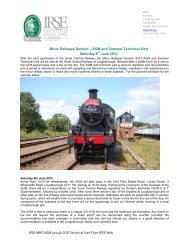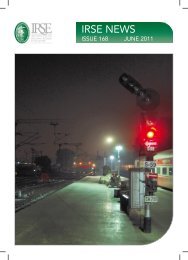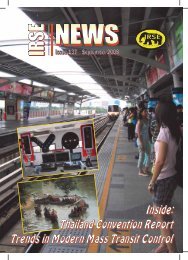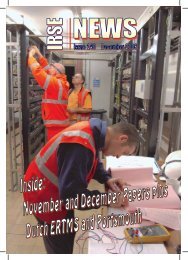IRSE News 150 Nov 09.pdf
IRSE News 150 Nov 09.pdf
IRSE News 150 Nov 09.pdf
You also want an ePaper? Increase the reach of your titles
YUMPU automatically turns print PDFs into web optimized ePapers that Google loves.
NOVEMBER PAPER<br />
Signalling: Have we lost the plot?<br />
By Eddie Goddard<br />
Paper to be read in London on 11 <strong>Nov</strong>ember 2009<br />
The author is a past President of the <strong>IRSE</strong><br />
INTRODUCTION<br />
This paper has two themes. The first concerns the need to<br />
ensure the continuity of signal engineers able to see the big<br />
picture. The second looks at the way that signalling is provided<br />
and, in particular, the role of assurance in the signalling process.<br />
It endeavours to show that there are linkages between the<br />
two and that the industry has to face up to the changes that<br />
have taken place. Finally it proposes a way forward to enable<br />
the signalling industry to remain economic and efficient.<br />
It relies heavily on the author’s experience and so is written<br />
from the point of view of UK Metro signalling in the United<br />
Kingdom. It should not be seen as relating to any particular<br />
organisation. However it attempts to bring in the experience of<br />
national railways and of other countries.<br />
SCENE SETTING<br />
Is perception reality? The following are views currently held by<br />
many outside the signalling industry and often expressed by<br />
those within it (see Ref. 1).<br />
They don’t make them like they used to.<br />
“When the current breed of signal engineers retire there will<br />
be no one left that understands the whole picture. All that we<br />
have now are specialists.”<br />
The weight of evidence.<br />
“The amount of documentation for a project generated to<br />
satisfy the assurer(s) outweighs that used to develop the project<br />
itself. The critical path now lies through the assurance chain.<br />
As a result project cost and implementation time are becoming<br />
untenable.”<br />
Why do these things matter? If they are true, then the cost<br />
of introducing new systems will become unbearable, signalling<br />
unaffordable and delays unacceptable. If we do not do<br />
something we will be left behind. Railways themselves will<br />
become uneconomic and will fall into decline. The benefits that<br />
they can bring will be lost, and we will all be out of a job. Even<br />
if they are not true the perception is still there, and unless we<br />
are able to counter it the signalling industry will be marginalised<br />
and investments made elsewhere (see Ref. 2). What is more<br />
likely is that new companies will be formed which are more<br />
willing to adopt new ways and able to undercut the traditional<br />
suppliers through adopting a radical approach.<br />
THEY DON’T MAKE THEM LIKE THEY<br />
USED TO<br />
Career Development<br />
To develop these themes the paper will consider the career of a<br />
typical signal engineer of an earlier generation—as experienced<br />
by the author at the time.<br />
Training<br />
A total apprenticeship of six years, starting as a Dip Tech Trainee.<br />
Academic<br />
Practical<br />
Signalling<br />
theory<br />
Management<br />
theory<br />
Railways<br />
Project<br />
Testing<br />
English, Maths and Physics at school.<br />
Sponsored for a Degree in Electrical and<br />
Telecommunications Engineering, and a<br />
Master’s Degree in Systems Engineering.<br />
Time spent in workshops, with the Maintainer<br />
on call and with an installation gang.<br />
Knowledge gained of practicalities, as well as<br />
the cultures of the different disciplines.<br />
Power Signal Linesman course and Drawing<br />
Office course.<br />
British Rail junior management course.<br />
Time spent with Divisional Inspector on<br />
stations and with drivers, looking into incidents<br />
and observing his staff management.<br />
Absorbing front-line operator’s culture.<br />
Time spent in control rooms and generally out<br />
and about on the railway.<br />
Produced a railway simulator for the Victoria<br />
Line through extensive work with rolling stock<br />
engineers to understand train characteristics.<br />
New communications system on live rails in an<br />
automatic train area. On the track, no lookouts,<br />
no briefing, no personnel protection equipment.<br />
Doing<br />
Design<br />
Producing “red inks” by copying the work of the Engineering<br />
Assistant (just two years older than myself!), then preparing<br />
circuits and having them checked. Being given feedback on the<br />
design and hence learning the best way. Seeing the approver<br />
work with the Engineering Assistant and his experience being<br />
fed back. Later still, seeing the two principal designers in active<br />
debate about the more esoteric aspects of the design.<br />
Installation<br />
Held the meter for the Principal Installation assistant (Tester in<br />
charge). Observed the final commissioning process where the<br />
tester, without reference to the circuits but used the scale plan<br />
and working from first principles ensured that the site<br />
performed as it should by using track dropping boards and lots<br />
of staff. Saw design anomalies picked up and circuit changes<br />
made through the designer sitting alongside the tester. Later,<br />
put in charge of testing a signal! Realising the homework that<br />
went into the testing process with study of circuits, and<br />
discussion of the designs before testing took place.<br />
2<br />
<strong>IRSE</strong> NEWS | ISSUE <strong>150</strong> | NOVEMBER 2009


